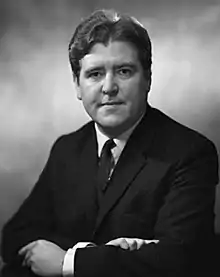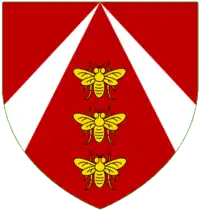Alf Morris
Alfred Morris, Baron Morris of Manchester, AO, QSO, PC (23 March 1928 – 12 August 2012) was a British Labour Co-operative politician and disability rights campaigner.
The Lord Morris of Manchester | |
|---|---|
 Alf Morris (1965) | |
| Parliamentary Under-Secretary of State for Disablement | |
| In office 11 March 1974 – 4 May 1979 | |
| Prime Minister | |
| Preceded by | Office established |
| Succeeded by | Reg Prentice (as Minister of State) |
| Member of the House of Lords Lord Temporal | |
| In office 6 October 1997 – 12 August 2012 Life peerage | |
| Member of Parliament for Manchester Wythenshawe | |
| In office 15 October 1964 – 8 April 1997 | |
| Preceded by | Eveline Hill |
| Succeeded by | Constituency abolished |
| Personal details | |
| Born | Alfred Morris 23 March 1928 Manchester, England |
| Died | 12 August 2012 (aged 84) |
| Political party | Labour and Co-operative |
| Spouse |
Irene Jones (m. 1950) |
| Children | 4 |
| Relatives |
|
Political career
Morris served as Member of Parliament for Manchester Wythenshawe from 1964 until 1997, having previously unsuccessfully fought the, then, safe Conservative seat of Liverpool Garston in 1951 and the Wythenshawe seat in 1959.[1] He served as Parliamentary Private Secretary to Fred Peart, the Agriculture Minister. Morris campaigned against British entry to the Common Market and in May 1967 Prime Minister Harold Wilson sacked him, and six others, for abstaining in a Commons vote on the issue. Fred Peart did not appoint a replacement and Morris continued to work for him, albeit unofficially. In 1968, Peart became Leader of the Commons and reappointed Morris as his Parliamentary Private Secretary.[2]
In 1970 Morris successfully introduced the Chronically Sick and Disabled Persons Act, which was the first in the world to recognise and give rights to people with disabilities.[3][4] In 1974 he became the first Minister for the Disabled anywhere in the world.[5][6] In 1991 he introduced a Civil Rights (Disabled Persons) Bill and he led campaigns on Gulf War Syndrome.[1]
He was created a life peer as Lord Morris of Manchester, of Manchester in the County of Greater Manchester, in 1997.[7] He was a life member of the GMB Union, the general trade union of the United Kingdom.[8] He served as President of the 1995 Co-operative Congress.[9]
Background
Morris (one of the eight children of George Henry Morris and his wife Jessie Murphy) was raised in poor circumstances in Ancoats, Manchester.[5]
In 1935, the family left Ancoats and moved to a new housing estate in Newton Heath.[7] He was educated at Brookdale Park School Newton Heath along with Harold Evans, who, as editor of The Sunday Times,[7] wrote a leader saying that: "As time ticked away to the 1970 general election, Alf Morris's Bill was the only piece of legislation worth saving." He received evening school tuition. He worked from the age of 14 as a clerk in the local Wilson's Brewery.
Morris, whose father lost an eye and a leg and was gassed while serving in the First World War, and then suffered a long decline in health and eventual death arising from his injuries, became a campaigner on behalf of those with disabilities.[7] After his father's death, Morris's mother was not entitled to a war widow's pension.[5] Forty years later, Morris himself put the matter right by changing the law affecting armed forces pensions when he became the UK and the World's first Minister for the Disabled.
Morris did his national service in the army, mainly in the Middle East, from 1946 to 1948.[7] He then studied at Ruskin College, Oxford (1949–1950), St Catherine's College, Oxford[7] (BA modern history 1953) and the Department of Education, Manchester University.
Morris worked as a Manchester schoolteacher[7] and university extension lecturer in social history (1954–1956) and as an Industrial relations officer to the Electrical Supply Industry (1956–1964).
Family
He married Irene Jones in 1950.[10] They had two sons and two daughters.[2]
His brother Charles Morris and his niece Estelle Morris have also served as Labour MPs.[7]
Lord Morris died in hospital on Sunday 12 August 2012 after a short illness, aged 84.[11] He was survived by his wife and children.
Awards and honours
- 1971 Field Marshel Lord Harding Award for distinguished service to the disabled[12]
- 1972 Louis Braille Memorial Award for outstanding service to the blind[12]
- 1979 Member of the Privy Council of the United Kingdom[2]
- 1989 Companion of the Queen's Service Order for public services, 1989 New Year Honours, New Zealand[2][13]
- 1991 Honorary Officer of the Order of Australia[2]
- 1997 University of Salford honorary doctorate[14]
- 1997 Life Peer[7]
- 1998 University of Manchester honorary doctorate[15]
- 2000 Named, with Chrissie Maher and Tim Berners-Lee, "Information Pioneers of the Century" by the UK's National Information Forum.
- 2005 MENCAP Lifetime achievement award[16]
- 2009 Honorary Fellowship of the Royal College of Physicians and Surgeons of Glasgow and of the Royal College of Physicians[16]
  |
|
Publications
- The Growth of Parliamentary Scrutiny by Committee (Oxford, Pergamon P., 1970).[12]
- Needs before Means: an exposition of the underlying purposes of the Chronically Sick and Disabled Persons Act, 1970 (Manchester, Co-operative Union, 1971).[12]
- No Feet to Drag: report on the disabled (London, Sidgwick and Jackson, 1972).[12]
- Alf Morris: People's Parliamentarian – Scenes from the Life of Lord Morris of Manchester (London, National Information Forum, 2007).[18]
Archives
- Catalogue of the papers of Alfred Morris at London School of Economics Archives
See also
Chronically Sick and Disabled Persons Act 1970 – UK statute making provision for chronically sick and disabled persons
References
- Cleminson, Peter "Alf Morris: the people's parliamentarian", The Legion, retrieved 23 January 2010
- "Lord Morris of Manchester". The Telegraph. 14 August 2012. Retrieved 23 January 2013.
- "Forty years of Chronically Sick & Disabled Persons Act". BBC. 21 May 2010. Retrieved 29 November 2010.
- Chronically Sick and Disabled Persons Act 1970 (UK)
- Frame, Don (2008) "Lord Morris tells his tale", Manchester Evening News, 21 January 2008, retrieved 23 January 2010
- "Alf Morris: The law that changed the world, one step at a time", Yorkshire Post, 3 December 2009, retrieved 23 January 2010
- "Inspirational MP owes it all to his childhood", The Advertiser, 11 October 2007, retrieved 23 January 2010
- "Obituary: The Rt Hon Lord Morris of Manchester" (PDF). www.scienceinparliament.org.uk. Vol 69 No 4. Science in Parliament. Autumn 2012. p. 24. Retrieved 26 May 2020.
He was a life member of the GMB union and served as President of the 1995 Co–Operative Congress.
- "Congress Presidents 1869–2002" (PDF). National Co-operative Archive. February 2002. Archived from the original (PDF) on 28 May 2008. Retrieved 10 May 2008.
- Dalyell, Tim (2006) "Sir Robert Calderwood", The Independent, 2 June 2006, retrieved 23 January 2010
- "BBC News – Disabled rights pioneer Lord Morris of Manchester dies". BBC. 21 May 2010. Retrieved 14 August 2012.
- "Morris, Alfred". The Archives hub. 2012. Archived from the original on 4 March 2016. Retrieved 23 January 2013.
- "No. 51580". The London Gazette (3rd supplement). 31 December 1988. p. 34.
- Lynne Williams (13 August 1997). "Honorary degrees". Times Higher Education. Retrieved 22 January 2013.
- Lynne Williams (29 May 1998). "Honorary degrees". Times Higher Education. Retrieved 22 January 2013.
- Anthony Murray (14 August 2012). "Co-operator & champion of the disabled, Lord Morris, dies aged 84". Co-operative News. Archived from the original on 18 August 2012. Retrieved 23 January 2013.
- Debrett's Peerage. 2003. p. 1143.
- Kinrade, Derek (September 2006). Alf Morris: People's Parliamentarian – Scenes from the Life of Lord Morris of Manchester. National Information Forum. ISBN 978-09557515-0-9.
External links
- Hansard 1803–2005: contributions in Parliament by Alf Morris